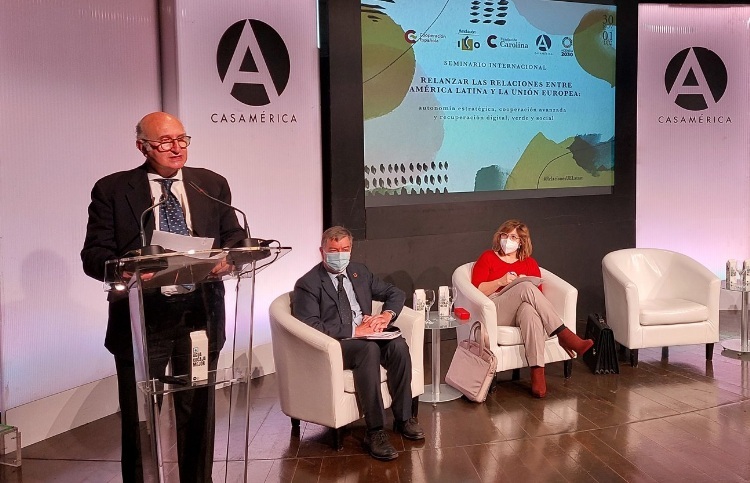Eduardo González
The Government has pledged to use the Spanish Presidency in 2023 to strengthen the strategic relationship between the European Union and Latin America.
“Spain is committed to a prosperous and stable Latin America in the political, economic and social spheres,” declared the State Secretary for Latin America and the Caribbean and Spanish in the World, Juan Fernández Trigo, during the presentation of the Seminar Relaunching Relations between Latin America and the European Union, sponsored by the ICO Foundation and organized by the Carolina Foundation and Casa de América.
“Latin America and the Caribbean are the scene of growing political competition between third actors, such as China and the United States,” and, in this context, “the consolidation of the EU’s presence has to be a priority issue in our common agendas,” he continued. For this reason, said Fernández Trigo, “Spain wants to continue to be the bridge between the two regions” that helps to promote and deepen “a strategic bi-regional relationship beneficial to both parties” and to “reactivate the political dialogue at the highest level between the EU and CELAC and to conclude the major agreements with Mercosur, Chile and Mexico”.
For her part, the State Secretary for International Cooperation, Pilar Cancela, said that in her contacts with the other EU partners she has noted a “relative loss of interest” in Latin America and the Caribbean, which is reflected in “a reduction in EU cooperation” and in the “decline in the relative weight of Europe and Spain in an area so close in values, culture and world views” to the benefit of “new actors in development cooperation with very different visions”.
“Latin America and the Caribbean is our closest neighbor in every sense, except geographically,” Cancela warned. Therefore, “the development of relations between the EU and Latin America and the Caribbean is going to be one of the priorities of the Spanish Presidency in 2023” through bi-regional cooperation based on “the triple social, green and digital transition, with gender equality as the great transformation,” she declared. “We have an opportunity that we must seize and enhance those common values, we must claim and build a new narrative of EU-Latin America relations,” she concluded.
At the same event, the High Representative of the Union for Foreign Affairs and Security Policy and Vice-President of the European Commission, Josep Borrell, addressed the participants in a video message in which he lamented that Latin America and the EU have been “too absent and too far away” and recalled, in this regard, that for “more than five years” (specifically, since 2015) no summit of Heads of State and Government has been held.
For this reason, he assured, the Commission is trying to push for “a relaunch” through “a renewed look at our strategic partnership.” “Democratic values are part of our common heritage but are being challenged on a global scale,” he said, and, for that reason, it is necessary to boost the relationship and deepen the political dialogue between Europe and Latin America through “a strategy of effective multilateralism to address common challenges,” such as vaccinations against COVID-19, “transformative, cohesive and inclusive” economic recovery and the fight against climate change.
At the same meeting, the director of the Carolina Foundation, José Antonio Sanahuja, also lamented the “disinterest” of “many Member States” of the EU towards Latin America and defended a new framework of relations between the two regions that contributes to “ensuring democracy”, to enhance European strategic autonomy “in the face of the nationalist narrative” and to a “redefining of international development” that goes “beyond the immediate response to COVID” and that promotes “a development cooperation that transcends the old North-South logic in favor of a more horizontal and inclusive one”.







